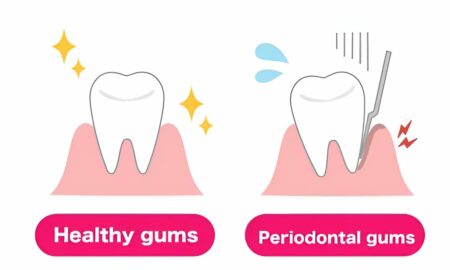Oral health is a significant part of your general health, and sometimes, even with routine dental care, your gums are not as healthy as they ought to be. You may then require visiting a periodontist. But just what are three conditions that a periodontist may treat? These specialists specialize in the prevention, diagnosis, and treatment of gum diseases, receding gums, and complications related to dental implants. Here are some common signs that may indicate it is time to book an appointment.
-
Bleeding or swollen gums
Brushing and flossing should not cause bleeding in healthy gums. Bleeding, redness, swelling, or tenderness might be signs that you may have gingivitis, the first stage of gum disease, and if left untreated, it progresses to periodontitis which needs a specialist in periodontology.
-
Persistent Bad Breath
Periodontal microbes can cause chronic bad breath, often referred to as halitosis. These microbes thrive in areas that contain gum pockets, where they multiply and feed on their pathogens. When plaque and tartar buildup along the gumline, it allows harmful bacteria to grow. If brushing and swishing with mouthwash do not help, a periodontist in Dearborn may assess your gums and correct the problem.
-
Receding Gums
Gum recession will make your teeth appear longer with their sensitive roots exposed. It may be caused by excessive brushing, periodontal disease, or genetic factors. A periodontist might find it suitable to have gum grafting performed on your gums in order to bring back the support for your teeth.
-
Loose or Shifting Teeth
If your teeth become loose or shifted position, this is advanced gum disease. Untreated, periodontitis will weaken structures supporting your teeth and eventually lose teeth. The dentist will give an estimation of how serious it is an appropriate treatment to make the teeth stable again.

-
Pain when Chewing
Gum infections or deep periodontal pockets can cause discomfort and uneasiness while chewing. Such pain should not be overlooked, as it could indicate a rather severe underlying condition that needs specialized care.
-
Pus between teeth and gums
Pus between your teeth and gum tissues is an indication of infection. If left untreated, gum infections can spread further and cause other oral health problems. A periodontist can help with deep cleaning and other treatments that can get rid of the infections.
-
Family History of Gum Disease
If you have history in your family about gum diseases, then a greater chance arises of developing those in your oral cavity. Get periodontally checked regularly with your dentist that may help control your gum state before it results in severe problematic situations.
-
Dental implant issues
A periodontist can evaluate if you have dental implants and are experiencing swelling, pain, or loosening of the implant. They specialize in the treatment of peri-implantitis, a condition affecting tissues surrounding implants.
Do You Need a Referral to Visit a Periodontist?
Many people wonder, “Do you need a referral to see a periodontist?” While some dental insurance plans may require a referral, most periodontists accept patients directly. If you are experiencing any of the symptoms mentioned above, you should consider scheduling an appointment with a specialist.
Take Care of Your Gum Health
Gum care is equally as crucial as dental care. With proper early diagnosis, serious issues with the mouth will be avoided. If you are seeking a dentist in Dearborn or a periodontist, Royal Dentistry is here to help.
Our professional staff provide the most excellent care to ensure that both your gums and teeth are healthy. Call us today for your appointment and finally take that first step toward greater oral health.

